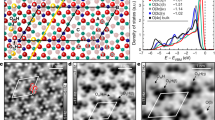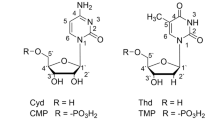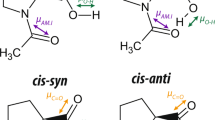Abstract
THE oxycarboxylic acids are very strong complex-forming agents, and both the carboxylic and the alcoholic hydroxyl groups take part in such formation. For calculation of complex stability constants it is necessary to know the acidic dissociation constants of both groups. However, the alcoholic hydroxyls are so weakly acidic that it is not possible to determine the dissociation constant by the usual methods. So far as we know, until now none of the oxycarboxylic acids has been investigated successfully from the point of view of acidity of alcoholic hydroxyls. The only data which we found referred to citric acid ; however, these were theoretical values1.
This is a preview of subscription content, access via your institution
Access options
Subscribe to this journal
Receive 51 print issues and online access
$199.00 per year
only $3.90 per issue
Buy this article
- Purchase on Springer Link
- Instant access to full article PDF
Prices may be subject to local taxes which are calculated during checkout
Similar content being viewed by others
References
Warner, R. C., and Weber, I., J. Amer. Chem. Soc., 75, 5086 (1953).
Schwarzenbach, G., and Sulzberger, R., Helv. Chim. Acta, 37, 348 (1944).
Stearns, R. S., and Wheland, G. W., J. Amer. Chem. Soc., 69, 2025 (1947).
Author information
Authors and Affiliations
Rights and permissions
About this article
Cite this article
BECK, M., HALMOS, M. Acidic Dissociation Constant of Alcoholic Hydroxyls of Oxycarboxylic Acids: Mandelic Acid. Nature 186, 388–389 (1960). https://doi.org/10.1038/186388a0
Issue Date:
DOI: https://doi.org/10.1038/186388a0
This article is cited by
-
The acidic dissociation constants of mandelic acid
Die Naturwissenschaften (1961)
-
Acidic Dissociation Constants of Alcoholic Hydroxyls of Hydroxycarboxylic Acids: Tartaric Acid
Nature (1960)
Comments
By submitting a comment you agree to abide by our Terms and Community Guidelines. If you find something abusive or that does not comply with our terms or guidelines please flag it as inappropriate.



